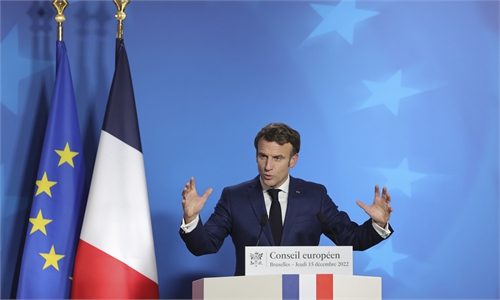When Nabob's descendants once again think of kowtow

Illustration: Xia Qing/Global Times
When French President Emmanuel Macron returned to Europe from his visit to China with a willingness to enhance cooperation, the word "kowtow" was frequently used to express dissatisfaction across American and European media reports.
According to the US media, US Senator Ted Cruz blasted President Joe Biden's foreign policy on April 12 in response to Macron's recent "kowtowing" to China, claiming that it had happened because Biden's policies toward Europe pushed France into China's embrace.
The Munich-based Süddeutsche Zeitung published an article headlined "Europe can no longer grovel." The Australian used the phrase Macron's "feeble kowtowing," while the British press was the bluntest, with the Telegraph running a commentary headlined, "The 'dirty secret' behind Macron's kowtowing to China."
When Nabob's descendants once again used the word "kowtow" to express their views on a rising China, what exactly were they thinking?
They are sure to remember the British mission's visit to China in 1793 (the 58th year of the Qianlong reign).
George Macartney (1737-1806) was not the first to take issue with the term "kowtow," but as an ambassador of the British Empire, which dominated the world at the time, he had the strongest reaction. It thus became a fundamental observation in the Western perception of China, with very long-term and negative consequences.
There is no doubt that since the 18th century, when European countries started to send missions to China, the word "kowtow" has been, with their perception of China, planted like a seed deep in their minds. Even today, when China has undergone radical changes, this seed can still give birth to new seedlings if one is not careful.
It is why the word "Nabob" also comes to my mind.
But the word seems to have been forgotten by the British and Europeans. Asians, especially Indians, will never forget it.
The English dictionary is always neutral in interpreting this word: "a person, especially a European, who has made a large fortune in India or another country of the East."
But to Indians, Chinese, and other people in Asian countries that British or European powers had colonized, this word implies disaster and shame. It seems unnecessary to describe how the Nabob reaped the colonial dividends their descendants still enjoy today through brutal and bloody plunder.
Nabob left behind the rules and order they constructed, which ensnared Asia like a strange circle one by one.
Their descendants naturally inherited this spiritual legacy. In the soul of these people, Asian countries should be their followers and follow the so-called order they established.
A China that has gone global through reform and opening-up and is trying to become a power-sharer is a dangerous challenger.
In the article "Kowtow: Ritual, History, and Power," published on July 5, 2018, on the New York Times Chinese website, US president John Quincy Adams, who served as a diplomat, was quoted as having concluded, after studying records of the Qing court's visits to foreign ambassadors, that the trigger for the First Opium War was not opium, but kowtowing. His inference remains inconclusive, but kowtowing has undoubtedly become a historical controversy over China's relations with the West.
It is clear that with the renewed transfer of wealth and power, the term "kowtow" gradually began to appear again in discussions of power relations between China and the West, the article concludes.
China-West relations being depicted as "kowtowing" indicates an essential source of perceived bias against China's rise.
China's rise is not "revenge" against its colonizers, and it will not plunder the wealth of Asian countries by force, as Nabob did back then.
China's development has created more opportunities and dividends for the world, including for the West, not by smuggling drugs or firing a shot. And such a transfer of power is inevitable.
The kowtow view is obsolete because the Eastern countries are no longer on the periphery of Western civilization but will be at the center of world civilization. Whether it is China, India, or some other Asian country, it will always be a power-sharer.
If someone still wants to return to the days of Nabob, then I'm sorry, it's never possible.
The author is a senior editor with People's Daily, and currently a senior fellow with the Chongyang Institute for Financial Studies at Renmin University of China. dinggang@globaltimes.com.cn. Follow him on Twitter @dinggangchina


